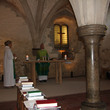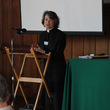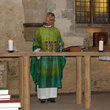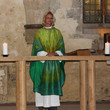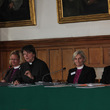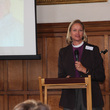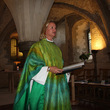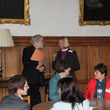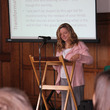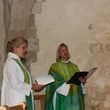Archbishop hosts conference on women's ministry
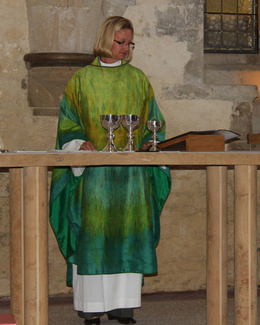
Monday 19th September 2011
'Transformations', a conference on women's ministry in the Church of England, was held at Lambeth Palace on Monday 19 September 2011.Some 60 delegates, both women and men, with a variety of roles in the church, came together to consider the present state of women's ministry in the CofE and to look forward to future developments and their implications for ministry throughout the Church.
The keynote address was given by Bishop Mary Gray-Reeves of El Camino Real in California, who also presided at the conference Eucharist, whilst the Panel Discussion was moderated by Bishop Kay 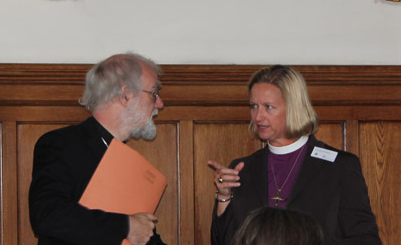 Goldsworthy of Perth (Western Australia). Bishop Mary stressed the essentially relational and negotiated role of ministry, which she contrasted with the secular model of power and domination of one's opponents.
Goldsworthy of Perth (Western Australia). Bishop Mary stressed the essentially relational and negotiated role of ministry, which she contrasted with the secular model of power and domination of one's opponents.
The Archbishop of Canterbury, in his closing remarks, noted that a key theme to emerge from the day's discussions had been not only the need to affirm women’s ministry but also to move towards a model of ministry which was more humane and realistic in its expectations of all clergy, which the conference had brought into sharp focus.
Proceedings of the Conference
Attached are:
- the Executive Summary Report (also shown below)
- the Full Report of the Conference, which includes the Archbishop's concluding remarks
- the Appendix
Executive Summary Report
‘Transformations – Theology and Experience of Women’s Ministry’
Introduction
A day conference entitled ‘Transformations - Theology and Experience of Women’s Ministry’ washeld at the invitation of Archbishop Rowan Williams at Lambeth Palace on 19th Sept 2011. The day was intended to allow the opportunity for honest reflection on the experience of 17 years of women’s ordained ministry and to celebrate all that this ministry has brought to the Church of England.
The conference was addressed by a number of speakers: Dr Paula Gooder, Rev’d Lucy Winkett, Rev’d Professor Sarah Coakley, Bishop Mary Gray-Reeves (who gave the keynote address), Bishop Kay Goldsworthy and Archbishop Rowan. In the afternoon the conference split into discussion groups and fed back to plenary. The Archbishop closed the day with some concluding reflections.
This summary report seeks to
- signpost the key messages of the conference speakers
- highlight the feed back to the House of Bishops from the group discussions
- draw out the themes that recur throughout the full report and make recommendations
The Key Messages of the Conference Speakers
Dr Paula Gooder presented a Bible study on Romans 12:1-2 drawing out the importance of embodiment (minds and bodies interwoven) in our self offering to God, the gendered nature of our life in Christ and the ongoing nature of our transformation towards becoming people of ‘the New Creation’.
The Rev’d Canon Lucy Winkettobserved how often our conversations about women priests centre on whether someone ‘has a problem’ with it – mostly people don’t. The majority reaction is acceptance and even celebration. Lucy offered two concepts she finds helpful in inhabiting her priesthood: Holy Wisdom and faithful imagination. Ultimately our confidence rests in our identity as those made in the image of God.
The Rev’d Prof Sarah Coakley spoke of the expectations of transformation attached to the ordination of women in the 1980s and three problems that have hindered those expectations for women’s ministry from becoming a reality: the open sore of theological and legal incoherence surrounding the ordination of women; the secular bureaucratisation of the priesthood and theoretical confusions about gender. She argues that In order to move forward we must heal the ‘deep suppurating wound’ of theological incoherence.
The Archbishop spoke of the two principal models of expectation that have existed around ordained women’s ministry: ‘co-option’ (women fit into male patterns) and ‘messianism’ (predicting complete change via a ‘uniquely female’ contribution). Both are inadequate. Instead our theology of priesthood should grow out of our theology of humanity. The full acceptance of women’s ministry provides an opportunity to re-think models of ministry for all.
The Rt Rev’d Mary Gray-Reeves spoke in her Keynote about power and how we share it. She gave two models: unilateral (power over -a server and a served) and relational (negotiated power -mutual servant-hood). We need both. She spoke of her experience of handling a parish opposed to her episcopal ministry - how insisting on building relationship rather than relying on ‘the canons’ was central to healing and growth. She counseled the CofE to avoid legislating as a means to resolve the conflict over the ordination of women to the episcopate as that will prevent reconciliation.
The Discussion Groups – Feedback for the House of Bishops
Archbishop Rowan asked the discussion groups to return to plenary with a short message ‘for the bishops, for the culture and for the Church’. These are recorded at the end of each discussion group in the full report. The messages for the bishops are summarised here for ease of reference:
- Scripture and attitudes to women
The Church of England needs to come to a common mind on what scripture says about the ministry of women. Ways should be found to assist the present House of Bishops to read scripture from a female (as well as a male) perspective.
- The Ordinal: the bishop’s calling and its impact on women
Strategic thought needs to be given to the way in which women bishops are introduced so that the weight of being the first female bishop does not fall on one woman alone.
- The shape of the Church and synodical processes
Do not amend the draft legislation for women in the episcopate any further. This would completely undermine the Church of England’s theological and ecclesiological integrity.
- Liturgy and language
Support and encourage the use of more expansive language and imagery about God wherever possible and hold the Liturgical Commission to account when they prepare new liturgy. Keep a gender-aware theology of worship in mind when visiting parishes and at clergy gatherings.
- Different patterns of ministry available to ordained women
We are losing gifted and skilled women who are not coming forward or are giving up because they cannot fit the model of full-time stipendiary ministry on offer. There need to be different models of ministry available that are not simply ‘non stipendiary’. The Church needs to monitor the deployment of all women clergy so as to steward their gifts.
- Issues for clergy couples
Clergy couples are totally reliant on the Church financially; celebrate their commitment and look for ways to support them. Parity and consistency of practice across dioceses is important.
- Patterns of appointment and statistical insights
Be adventurous in the people you appoint to senior roles and as bishops.
Key Messages of the Conference - with recommendations from the Steering Group
Certain key themes recurred with striking regularity throughout the course of the conference and in the material circulated beforehand. These are summarised below with recommendations to the House of Bishops from the Steering Group as to how to take the conversation forward.
1. Celebrate the presence of women as ordained ministers of the Church and use the opportunity given by the full acceptance of women’s ministry at all levels to rethink models of ministry so that priests and bishops are enabled more fully to incarnate ‘the new humanity’.
2. Engage institutional levers in Ministry Division and Synod to change the dominant ‘male’ pattern and culture of ordained ministry and to resist the creeping bureaucratisation of the priesthood (with its idolatry of busyness and toxic culture of overwork).
3. Monitor and encourage research into the continuing integration of ordained women into the life of the Church via the establishment of a Women’s Desk in Ministry Division.
4. Acknowledge and address issues of gender exclusion and marginalisation of women priests paying particular attention to ways of increasing flexibility in patterns of stipendiary ministry and the needs of clergy couples. Establish a working party to develop national guidelines.
5. Acknowledge and address the theological incoherence that feeds discriminatory culture and practices. Invite The Rev’d Professor Sarah Coakley and others to address the House of Bishops on this issue.
6. Acknowledge and address the need for a prophetic theology of gender, grounded in scripture, that values the gifts that priests, whether male or female, bring. Invite the Faith and Order Commission to work on this with a view to producing study materials for use at all levels in the Church.
7. Encourage the Liturgical Commission in the use of a broader and more inclusive range of metaphors for God in worship and in an examination of the latent masculinity of our inherited patterns of worship.
8. Prepare to welcome women to the House of Bishops by initiating and embracing a change of culture that avoids simplistic notions of ‘co-option’ or ‘messianism’. Invite women bishops from other provinces to facilitate House of Bishops’ meetings before the first consecrations here.
Read a transcript of Bishop Mary's address below, or listen to the audio [35Mb]
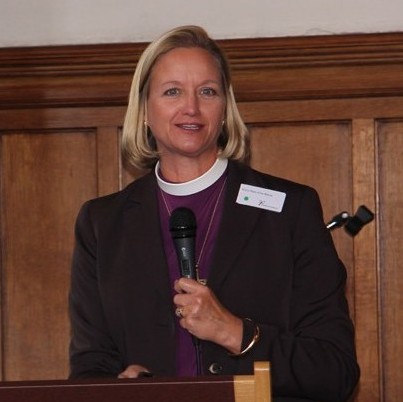
It’s just a profound honour for me to be with you here today. But I’m going to apologise, right upfront, because as I listened this morning, my story is in a really different place from where your first women bishops are going to be and what their story is going to be.
So it might feel like we’re a little out of synch and I’m not doing that intentionally, I’m going to speak out of my experience and if it feels like that for you, I’m sorry. But, at the same time, let it be a point of wondering for you of what it might look like somewhere down the road.
I was the fifteenth woman in the Episcopal Church. There were women already retired from active ministry as bishops when I became a bishop. My election, I was elected and we elect in our diocese, I was nearly on the first ballot. My gender was really not a big issue. So that’s where I’m coming from and the space from which I hope to connect with you and perhaps to provide some hope and maybe some different ways of thinking about this.
As well, I am a practitioner of this thing called Episcopate. You heard beautiful academic work this morning and I’m not that. So if I can relieve you of that expectation, that would be great.
I was ordained a deacon in 1994, a priest in 1995 and a bishop in 2007. I would like to introduce you to my family – my husband Michael and our two children – Katie, Dorian is our son. Katie is eighteen is Dorian seventeen. Katie by birth, Dorian by adoption. So we’re big into the whole teen experience. And a question I get asked every time which is the one probably running around in your head: “how are you possibly a bishop and a mother and a wife all at the same time?” And I don’t think it’s any different to any other professional woman’s career so I think we just need to let it go that there is some special onus on us as women clergy.
I have a great husband, we share things around the house, my kids have been doing their own laundry since about the age of fourteen and they can all prepare a meal for the family. And that kind of up bringing has served them quite well as my daughter has gone off to college and is far more independent than some of her first year university colleagues. So some of those things are not a bad thing at all.
And Katie, I can remember once, when she was around 16, came home and said: “Why aren’t you like other mothers?” And I said, “Tell me about these other mothers.” They’re the ones that make things for the school events and the PTA - but I serve on the board of the PTA because it’s an Episcopal school. So I said, “Yes, you’ve got to leave room for other people to do their thing.” You shouldn’t do it all – be the bishop, be on the board and bake cookies for the PTA. Something’s got to give there, for their sake, not so much for mine.
And about six months later, the parents were embroiled in something and she came back and said, “I’m really glad you’re not like other mothers.” So I’m glad we had that settled.
I want to just tell you a bit about the Diocese of El Camino Real where I come from. We are geographically and culturally a very diverse place. About 2.5 million people in our total demographic. The diocese itself is 275 miles long and we’re on a stretch between San Francisco and Los Angeles but there’s still a few hundred more miles between those two major cities that people will know. But that’s the easiest reference point.
Agriculture and technology and education are major industries. We produce huge amounts of food for our country – they refer to us as the salad bowl of America and our diocese includes about half of silicone valley. So I say to people when you’re sitting eating your salad, checking your email on your iPhone, think of us!
Our church membership is only about thirteen thousand. We count differently than you do, so we count actual membership in a congregation rather than geographical setting. Our average Sunday attendance is just about five thousand and that will range from … one congregation has like twelve people, another has five hundred. So it just depends; we have rural areas and dense urban areas.
We’re forty-eight congregations worshipping in four languages. Based on our cultural diversity, we could probably be worshipping in at least fifty. Out outreach is typical – we have average Episcopalians which, in the United States perhaps, is like here. Middle class, tend to be well educated and white, lots of outreach ministry to the physically and spiritually poor. To homeless students, prisoners, farm workers, gangs – we have a huge gang problem in California, which is related to drug trade and immigration. It’s a very complicated issue but it’s something in which the churches are partnering to be involved in and it’s something near and dear to my heart.
But ministry opportunities for us are really about sharing the good news of Christ with people where they are. I think in our diocese we’re trying to get in touch with that reality that we’re probably talking to ourselves, and we would like to get in touch with a different reality. So we want to be present to a context, whichever one we live in, which is again very diverse and very local. I’d like to close that gap between the culture of church and secular life, whatever that word ‘secular’ means. That has a lot of meanings as well.
Sharing our resources of intellect, time and money - as we age as a church (as you all are ageing) I have retired folks who have brilliant educations. They have time to share and getting that out into the community is something we would really like to do. We’d like to expand our repertoire of being in church. Most of us are fixed in the 10am slot on Sunday morning and moving out of that is something we are exploring.
We want to create safe space for spiritual exploration and Christian community and create a multi-generational and multi-cultural church. So trying to bridge some of the segregation that we experience in our culture.
Today I want to talk to you … I was given free reign which is a very dangerous thing. But I think I’ve got it right after prayer and pondering and that kind of thing, to just talk about power and how we share it because when you’re a bishop you’re over the whole thing. I mean your vision … you’re the only one in the diocese, in the Anglican Communion for that matter, who can see how the pieces fit together.
But I want to define power today as the ability to act, and everybody has the ability to act. It is inappropriate for us, as human beings and Christians, to think that we have no power. So if you think that, stop it.
In our diocese … El Camino Real has existed for thirty years. The state of California has existed since 1859. It started out as one diocese and turned into six. We’re at the tail end of that. When they developed the diocese, they envisioned this very empowered lady, as I mentioned earlier, and they envisioned a bishop that would rove around. The original idea was that the bishop would be in this RV, this recreational vehicle, driving up and down the diocese. I said if you didn’t take one look at me and know that I wasn’t going to be that kind of bishop, you were deluded.
But anyway, the first two bishops, it didn’t go very well. They both came in with a pretty traditional model of Episcopate, pretty much my way or the high way. And it didn’t go well with the DNA, if you will, of the diocese. And every diocese has a DNA, there are no two alike, they are like people. So knowing the system in our diocese was really important and what we discovered that honouring the gift of power in all people is really key. And while we’ve done that really well within the church, now it’s time to do that with those outside the church because to suppose that because someone’s not in the church they have no power, I think, is more disillusionment.
They do have the power, people have to power to say yes and no to develop a faith life, all of those things. So it’s part of our faith culture in our diocese to honour the gift of power in all people. As I mentioned before, the gift of ministry, which is certainly all about a conversation, but for us it’s a very helpful frame and tool to think about boundaries, to think about being collaborative with one another and to think about being respectful of people’s authority and to also think about being accountable.
So we have a history in our diocese where the really hard stuff that people don’t want to do, they give it to the bishop. So because we have an empowered lady that actually understands its order of ministry, I can say, “Actually that’s yours. It’s not mine. So I’ll help you figure out how to do it, but in fact, this is your order of ministry.” And that’s been really, really good for us.
I’ve also learned, as a bishop, and as a human being I think, in that ability to act, power is shared differently in different contexts. So what might happen in one diocese or congregation isn’t necessarily going to work out the same way in another. Now, we have Latino congregations, I’m fully bilingual, but I don’t express my power quite the same way I do in one of my Latino congregations as I might in one of my Anglo highly educated congregations. It would just be a different setting and it’s about learning how to speak the language of power and work with the context.
Again, because it’s not my first context, I have no power to act. I think, “How am I going to act? How will I use my power to act?” We always have a choice about power between agency and victim hood. We always have a choice. We don’t ever, ever have to be a victim based on what somebody thinks of us or based on what a whole structural system says about us. We always have agency, we always have the ability to act.
And I want to advocate for the honest sharing of views on scripture, on theology and ethics. We have a triad partnership with the Diocese of Gloucester and with the Diocese of Western Tanganyika and it kind of came out in Lambeth conference – how much difference could you get in a room and have a relationship that might work? And we have a relationship that works really well.
But we started with a few principles. One was that we weren’t out to convert the other to our point of view and the other was that we would be honest. So I was honest about who I am, how I read the text and how my theological values work and what’s really happening in my diocese. And each of my partner bishops – at that time Gerard Mpango, now we have Sadock Makaya in Western Tanganyika and Michael Perham in Gloucester, also abided by those principles.
And it makes a really big difference when you’re trying to work out a situation in which everybody has some power.
Change is sustainable when it’s incremental. Sometimes it comes in sweeping transformations like a renewal of our minds. But after you are renewed, after your mind is converted, sustaining the change that is required is sometimes really hard work.
We have a growth rate in our diocese of two percent. And two things struck me there – one, it’s not decline, our decline stopped. And it’s a very sustainable rate of change, a very sustainable rate of change, that we can keep moving along. So I’m not looking for a big, flashy ten or twenty percent, I’m really happy with that two percent. Because I know when I leave the diocese of El Camino Real, we can look around at each other and say this was good and it’s set and it’s solid and it will do what it needs to do. So remember we have a great bit story of salvation here.
I was mentoring a group of women clergy under twenty-five a few months ago, just decided to have a retreat for them, and it was so much fun to be in a room with women under the age of twenty-five who happened to be all priests. And I kept saying to them all weekend, “You can have it all, just not all at once.” Because you remember back in your thirties, you were making decisions about marriage and babies and, you know, all of that stuff. And it just seemed like it all had to get done in about two days. But it doesn’t.
Let’s see. Change my slide here. So I’d like to talk about two different kinds of power or authority. We had a really good conversation up here about authority versus leadership and leadership is very pop, there’s a million books out about it. Do this and this will happen.
But in the church, we talk about authority and certainly the authority of ordained ministry is that you in the church of God all agree that there’s something there, happening. And our exercise authority is not just in the action but also in what’s going on inside of us. And so there is an inherent spiritual authority and a sense of wisdom of when to act and when not to act.
So unilateral authority involves power over, zero sum game, a server and a served. It’s the most common way we think about the use of authority and the use of power. It is a paradigm, it’s not the only one, but it is a paradigm. We often think about it in the church and we often apply it to bishops.
The problem is, and anybody who’s an academic in the area will tell you, that as the world’s cultures become more complex the idea that a zero sum game is going to work is just falling away. Life is far too complicated to say, “If you do this, then this will happen and it will always stay that way.” It’s far too complicated to say, “I’m going to have power over you and treat you as that I have more power than you and you have less and that’s going to work out.” It doesn’t work that way any more.
It’s interesting because in Christianity we often work on the model of a server and one to be served. So in order for your ministry to exist, in order for my ministry to exist, I need someone who needs me. Right? But you can hear a lot of stuff in the room about days off being completely tapped out. That’s not working too well.
And I’m not saying that we should lose this paradigm but I am saying that Jesus actually offers a model in the gospels of mutual servant hood. And that changes the power over thing because if I have to serve you, you need to be served; I’ve got some power over you.
But if we talk about mutuality and servant hood, that changes the conversation and it honours that the person who may need something from you also has something to offer you. And that changes how it works. It actually stops the objectification of people.
The option is relational authority. And I don’t want to label one of these bad or one of these good. The reality is that, as a bishop, sometimes I’m unilateral in my authority and I say, “I’m the Bishop, this is how it’s going to go.” And then I try to be as relational as I can within the unilateral option that I have offered.
So I’m not labelling one as good or bad, in fact, it’s probably not good to use one or the other exclusively but, in fact, to just develop that repertoire, that stewardship under your authority. And what’s the best way to use it right here in this given moment?
Negotiation is hat the heart of relational power. One of the tricky things, I think, in this debate around bishops who are women, is that it’s very hard to negotiate with people who think you don’t exist or that don’t want you to exist, and that makes negotiation pretty tricky. But any time you can find your way into a position where you can say, “I want to give you something and I’d like you to give me something of mutual servant hood of negotiation” that’s your ‘in’ to transformation.
We do have to be willing to be transformed, to have our minds renewed. We do have to be wiling participants. God does not force that upon us. But relational authority works by way of saying, “Let’s just find a little opening.” In our triad partnership, that’s what we did, we just found an opening. And we took it day by day in the first four months. People were saying, “There’s something extraordinarily close about you all, in your partnership.” And I say, “That’s because we argued for the first four months.”
And it’s true because we told the truth to each other and we had to find our space of negotiation. What were each of us willing to give in order to create some safe space that we could inhabit together so that something could grow and develop?
Relational authority requires us to keep the greater good in mind. Again, recognising that incremental change is sustainable. If you’re going for that, you’ve got to keep that what are we doing this for? Why does that really matter? Honouring and respecting that all people have power. So even if there are people you perceive as having no power they have some power.
The use of relational power is messy. It requires high tolerance for difference and the ability to live with decentring, which means that you are not always going to be in the position of having more power. But in the bigger scheme of things, you’re going to get to where you’re going. So that sub-zero game, you just have to let go of it and recognise that you’re going to be moving here and there. Does that make sense?
The thing I love about relational power is that everyone gets to participate in the decision making and living out at the ministry. You get a lot more creativity when you’re in relationship with people. You discover things about people you had no idea about and there’s always something fruitful that comes of it. Most importantly, because it’s our mission as a church, the reconciling presence of Christ is made known and we develop a greater trust in that power and authority which, as Christians, we believe is relational. We are a relational faith, grace that covers the common life and relationships are empowered.
I want to have a little laugh at that for a minute. I’ve been pondering all this because coming from a context where we don’t have this debate going on, I spend five minutes a year on the subject of being a woman bishop and actually, most of the five occurs when I’m here. It’s a non-issue in my context; we’re a long way down the road.
Time does heal things but as I’ve been experiencing this, I can argue this thing and say, “This is the right position.” I mean, you obviously know what I think. But it doesn’t matter. I think it was Hafiz, or one of the Sufi poets, who said, “Beyond the field of right-doing and beyond the field of wrong-doing, there is a field. I’ll meet you there.” And I think you need to find your way to that space and as we were worshipping today, I thought, you know, the most heartbreaking thing about watching this debate go on, it causes a lot of pain, you can see it. I can see it from outside of your context how very painful it is.
But as I ponder the sort of strategising about legislation, the most difficult thing about it is that you are going to prevent reconciliation from happening and that’s what I’m struggling with as I watch this thing happen. I’m thinking, “Wow, they’re going to delay reconciliation between these two sides, even longer.”
And my experience as a bishop, which is a unique experience to bishops, is that we’ve got to work with the canons. Because when the bishop gets called in, I say you’re at the point of the canons. And that means that you’re at the lowest common denominator of relational functioning. The relationship has completely broken down when you have to go to the canons and say, “Here’s what the law says you should do.” And so when you enforce that, when you say you’re going to create canons that prevent reconciliation from happening, I’d ask you to think about that. Think about that.
I’m just going pause for a moment to think about language and then I’m going to tell you a really great story about reconciliation. There is no such word a ‘woman bishop’ it doesn’t exist. I had somebody Google it for me the other day in a meeting and it actually refers to the breakaway movement of the women’s ministry in the Roman Catholic Church. They use it.
It’s not a word. I have two Bishop Barbies in my collection. I think they’re the only two on the planet. They are here before you, they are for the first time being shown in England. And I was not offended when I received these, I thought they were absolutely hilarious. They come about because the daughter of my cathedral Dean, on the day we were having our very first partner diocese visit.
So we have three bishops in our cathedral, there’s people from this country and from Tanzania and it’s a big celebration and Alexandra, at the time, was six and we had a little love affair going between the two of us. So when I’m there, she’s chasing after me, and we hang out. So I’m getting these bishops settled and taking off my vestments in my office and she’s just chattering non-stop. You now six-year-olds like that, they don’t shut up, right?
She’s going on and on and I said, “You know, Alexandra, I have to go to the restroom now” which is what we say to go to the loo. “Oh great, I’ll come with you.” So we go to the loo and she’s chattering and chattering away and we’re exiting the loo and she stops suddenly and she says, “You know, Bishop Mary, there is no Bishop Barbie.” And I said, “Well, Alexandra you’re right.” And she said, “Well, we need to work on that.”
So I found her mother, who is a nuclear physicist and I said, “This is the funniest story” and she was mortified. But as I told the clergy the story a few days later they decided I needed a Bishop Barbie so they had one made for me. She, on her right, someone else made me the one on the left.
But I say that because someone this morning, Lucy, was talking about culture and the cultural influences about how women are viewed is very powerful. It doesn’t disempower us completely, but it’s powerful. And this is not just a theological debate, a scriptural debate, there’s a whole lot of stuff here, including herself, Barbie.
And she is still shaping, along with the rest of the culture, the minds and the hearts of six year old children of nuclear physicists whose bishop is a woman. That’s just reality, we have to negotiate with that.
Again, be careful about saying relational power is what women do. I know lots of men who are great at relational power. It is, what you were asking about, how does it change the culture of the House of Bishops? Our House of Bishops is different because there are women in it. We do negotiation a lot better. A lot less kind of unilateral posturing goes on in our house because there are women there and I say that because to culturally survive, you have to negotiate.
I can’t just walk out on the street here at ten o’clock at night and not have to negotiate my reality as a female walking alone at night. I have to deal with that and so our place in the culture requires us to subconsciously negotiate our place in the culture all the time. It makes it really hard and really painful in the church when we feel like we have this thing called Baptism and the Ministry of all the Baptised and, yet again, we have to negotiate our place. And that’s why it’s so painful. If you don’t understand why it’s so painful, that’s why it’s so painful. We have to do it all the time everywhere and we would long to be in a church where we didn’t have to do that.
So I have one congregation who have a problem with my being a female, their new bishop being a woman. And this is Little Saint Johns in Monterey, which is an ageing congregation. That’s Bob Ott, he’s the new Rector, you can’t see it terribly well. They are a 1928 prayer book congregation which is traditional in its orientation, you know, facing the wall, old liturgy and so on.
I was, you know, a kid just learning to read when we let go of the 1920 prayer book in my church so it’s really not part of my language or church culture at all. But it’s very strongly part of theirs.
Their priest, when I arrived, had been under investigation for something that was settled, but literally as soon as it was settled, somebody pulled up another complaint. So I’d been a bishop maybe two weeks and I called the rector and said, “We have to talk.” And this is one of those unilateral times. Discipline, that’s my territory.
So he arrives in my office with twelve members of his vestry and I said, “Well this is interesting.” And they’re just determined that I’m going to close the church. And I said, “I’m not going to close the church, let’s just take a big deep breath and calm down for a minute and talk this thing through. Unfortunately, I had to discipline the priest and it was at a time of unilateral authority where I said, “Either you do this or you don’t get to be a priest any more.”
And he chose not to be a priest any more and he left the Episcopal Church. And on the one hand, that was a shame. On the other hand, it actually got him to a place he needed to be and got him the healing that he personally needed.
Meanwhile, it gave me the opportunity to say to the congregation, “Let’s negotiate how we’re going to have a common life. The only not negotiable thing is that we do not have a relationship. We cannot do that, not only according to the canons but because we’re Christians and we’re going to have to learn to live with each other. So let’s take it really slow and figure it out.”
So I counted all of our parish meetings, I counted all of the vestry meetings as visitation time. I said, “Let’s just be a little big more liberal with the canons and not worry about worship at the moment.” And that took about three years and I celebrated my first Eucharist there last fall and then next year we plan to do a confirmation.
And we have a fabulous relationship and one of the great things is that this 1928 ageing congregation, which is actually growing in its own right, is partnering with the latest Fresh Expressions emerging church thing that we’re doing in the diocese. Now would you ever put a 1928 prayer book congregation with Fresh Expressions?
But what’s happening is this young woman, Robin Denney, who some of you know, she was a missionary in Sudan, has just returned from Sudan and we had this congregation that’s just sitting out there in this town called Gonzales which used to be mostly Anglo, Anglos have all died off, Latinos have moved in, the Anglos didn’t know what to do with them twenty years ago, church died. So we’re going to reinvigorate it and re-plan it.
But Saint John’s has a real heart for Gonzales because one of their former rectors built that church. So they came to me and they said, “We’ve had a vestry meeting and we’ve decided we’re going to tie some of our rectors time to help this ministry and we want to help it grow.” So I said, “Great, Trinity Gonzales can be the preaching station for Saint John’s Monterey.” And they are so excited.
Now if we’d stuck to the canons, if we’d kept our relationship as minimally … as minimal as it could be, we would never have gotten to this level of creativity. You see, I can’t think this stuff up, I need a holy spirit. This was way beyond my imagination.
And it’s a great story and I just can’t wait to see what happens. There’s a work day, a week from Saturday, and they’re taking out all the pews. I can’t imagine a 1928 prayer book congregation taking out pews, but I’m going to go watch on Saturday morning and help take those pews out. And I’ll just wait and see what God’s going to do with that.
So I encourage you not to limit yourself but to actually create space for relationships where God will do infinitely more than you could ask for or imagine. So through this kind of stewardship and authority.
I just thought I’d show a few pictures of just normal life. My bishop’s life looks just like any other bishop’s life. I confirm, I baptise, I have relationships with bishops in the Anglican Communion. Life is good.
So with that, it’s time to go to questions. I’m slightly over time I think. I was meant to leave about fifteen minutes for questions so I’ll just open it up and then somebody call time on the Q&A.
Question:
I’d just like to be sure I heard correctly what you were saying at the end there about reconciliation and the canons. If I think I heard you correctly, it’s saying that to enable a way for reconciliation and for relationships and if that goes down the usual route, that gets closed off and can leave a split that can be there for a long time.
Bishop Mary:
That occurs to me, yes, as one who has to work with the canons, that’s what occurs to me. If you legislate the relationship, what you’re saying is, “It has to be this way” rather than just leaving it open, and let people figure it out. I know, as a woman ... I don’t know, I know for myself I’m not going to force myself on a congregation. That’s abusive. I’m going to find a way to work with that.
And I want to trust … I mean, I trusted Saint John’s Monterey and they trusted me and we worked it out. I’ve had other situations where I’ve had to be the law to a priest, I’ve had to be, he was doing damage to the congregation so I’m like, “I’m sorry, you’ve got to go.” We had a departing bulk of a congregation leave for the Anglican Church in North America.
The rector and I worked really well together. For the departure we had a service of ending of ministry, we handed back keys, it was a very beautiful thing. No press, no Bob Duncan heralding the moment, none of that. The parishioners in the two congregations still have covenant groups together.
If our ministry is not reconciliation what is it? So they’re divided on human sexuality but they’re finding a way to pray and do bible study together. I’m not going to prevent that; I’m going to support it. Not to get my people back because they’re God’s people. I am suggesting that. I’m not in this church. I don’t live here. This is your local context. I’m just suggesting that while legislation might feel like the way to calm it down, what you might end up doing is preventing the healing from happening. And I don’t know that, I’m just asking you to consider it. It’s a possibility.
Question:
I think I just want to affirm that and say that the number of times people have said when I came I was against the ordination of women but seeing you there you have changed my mind. If we legislate then all we’re going to do is put each other in boxes so never the twain shall meet.
And people won’t ever get a chance to come and hear … not that we set out, as you said, we don’t set out … we just get on with the business of the ministry. But I believe entirely to legislate, to put something in concrete is actually going to take us … in seventy years it’s still going to be there.
Bishop Mary:
Yes, it objectifies the other and assumes that you know everything there is to know about them. And we do not know everything there is to know about another.
I met a Bishop at Lambeth of this church who, on our first day, we were doing introductions of one on one and he came and sat next to me and began to speak. He said, ‘”I chose you because I know you won’t agree with me.” And I said, “Well, okay, why don’t we just sort of start again. I’m Mary.” And we did and we had a great conversation and actually all through Lambeth we had really great conversations.
We are miles apart on our views and our theology but the assumption was he assumed I knew everything I needed to know about him and that he knew everything there was to know about me. And when we objectify people like that, we are way out of God’s will. It is not how God connects with humanity as we understand it in the incarnation of Jesus Christ which is relational and personal and taking people where they are.
And it’s a lot of work … actually, I think it’s less work. Once you do the relationship thing you can just tell people, “Let’s calm down. We can work it out.” And the more trust you build, the more confident you are that you can work it out. I think now, in our partnership, there’s probably nothing we won’t work out because we’ve been over some pretty tough hurdles and, you know, we’ve got big differences in theology and the way we read scripture and think about women and kids and sexuality and all that stuff.
But the relationship is so important to all of us that I’d be hard pressed to let it go. And I’ve made some difficult decisions around it that have cost me. But at the same time, I have to honour what God’s put together here, you know.
Time? Okay. Thank you all very much for your attention.

